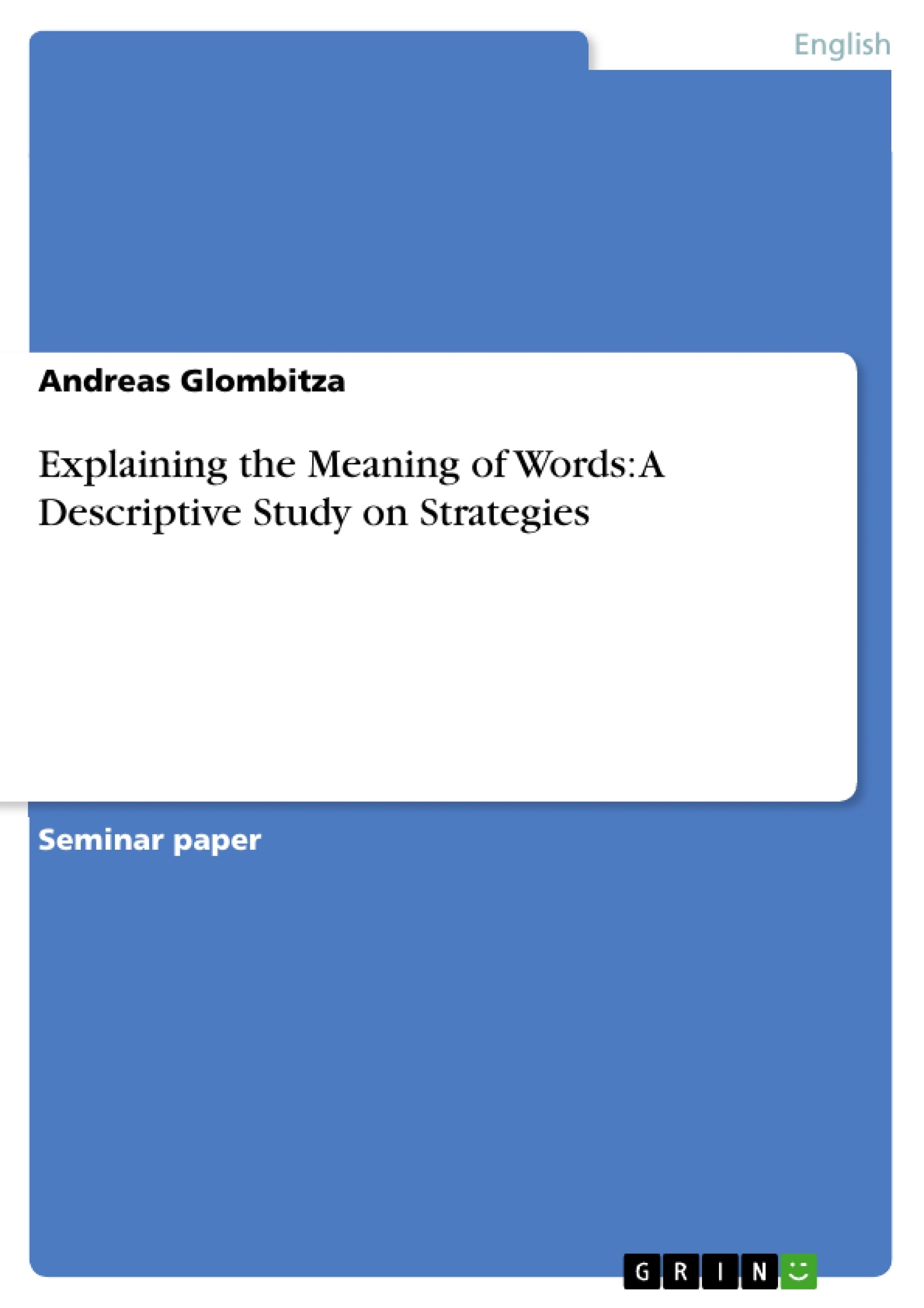This paper seeks to describe and analyze typical strategies employed for explaining unknown words. The empirical component is based on a small video-corpus comprising 4x6 interviews with native as well as non-native speakers of English, transcripts are included in the Appendix. The material is analyzed by means of a theoretical apparatus taken from lexical semantics and pragmatics.
Table of Contents
- 1. Introduction
- 2. Preliminaries: Theory and Terminology
- 3. Retrieving Data for a Collection of Strategies
- 4. Isolating Strategies, Establishing Relations
- 4.1 Strategies involving intension
- 4.2 Strategies of Reference
- 5. Conclusion
- 6. Appendix
- 7. Works Cited
- 8. References
Objectives and Key Themes
This study aims to analyze how speakers explain the meaning of words, focusing on the strategies employed. The research observes and categorizes these strategies using a theoretical framework from lexical semantics and pragmatics. The data consists of oral explanations, allowing for a close examination of the thought processes involved in defining words.
- Strategies for word explanation in oral communication.
- The interplay between intensional and referential strategies in defining words.
- Analysis of lexical meaning, sense, and denotation.
- The role of context in understanding word meaning.
- Comparison of different competence levels in explaining word meaning.
Chapter Summaries
1. Introduction: This chapter introduces the study's focus on lexical semantics, emphasizing the distinction between spoken and written word explanation. It highlights the importance of oral communication in understanding the process of defining words, contrasting it with written methods and focusing on the “gradual formation of thoughts” during speech. The chapter lays the groundwork by establishing the study's methodology, which involves observing and analyzing speakers explaining lexical items and identifying the strategies they employ. The researchers aim to present their approach, describe its implementation, and categorize the most prominent strategies used in explaining word meaning.
2. Preliminaries: Theory and Terminology: This chapter establishes the theoretical foundation for the study, drawing upon concepts from linguistic semantics and pragmatics. It discusses different aspects of meaning, including lexical meaning, sentence meaning, grammatical meaning, and utterance meaning, emphasizing the interdependence of semantics and pragmatics. Key distinctions are made between sense and denotation, and the concepts of reference, intensional relations (synonymy, hyponymy, antonymy), and syntagmatic relations are explained. The chapter also introduces componential analysis, highlighting its role in understanding denotation through contrastive features and the structural relationships between lexical items. The chapter concludes by acknowledging the broader cognitive and pragmatic perspectives underpinning the study.
3. Retrieving Data for a Collection of Strategies: [This chapter summary would be added here if the provided text contained chapter 3.]
4. Isolating Strategies, Establishing Relations: [This chapter summary would be added here if the provided text contained chapter 4.]
Keywords
Lexical semantics, word explanation, communication strategies, intensional meaning, referential meaning, denotation, sense, pragmatics, componential analysis, oral communication, cognitive processes.
Frequently Asked Questions: A Comprehensive Language Preview
What is the overall focus of this study?
This study analyzes how speakers explain the meaning of words, focusing on the strategies they employ. It observes and categorizes these strategies using a theoretical framework from lexical semantics and pragmatics, based on data from oral explanations of words.
What are the key themes explored in this study?
Key themes include strategies for word explanation in oral communication; the interplay between intensional and referential strategies; analysis of lexical meaning, sense, and denotation; the role of context in understanding word meaning; and a comparison of different competence levels in explaining word meaning.
What theoretical frameworks are used?
The study draws upon concepts from linguistic semantics and pragmatics. It utilizes componential analysis to understand denotation through contrastive features and the structural relationships between lexical items. The interdependence of semantics and pragmatics is emphasized, along with distinctions between sense and denotation, and concepts like reference, intensional relations (synonymy, hyponymy, antonymy), and syntagmatic relations.
What type of data is used in this study?
The data consists of oral explanations of words, allowing for a close examination of the thought processes involved in defining words. The study contrasts this approach with written methods, emphasizing the "gradual formation of thoughts" during speech.
What are the main chapters and their content?
The study includes an introduction outlining the methodology and focus on oral communication; a chapter on preliminaries establishing the theoretical foundation; a chapter (content not provided) detailing data retrieval strategies for a collection of explanation strategies; a chapter (content not provided) on isolating and establishing relations between strategies; a conclusion; an appendix; works cited; and references.
What are the key strategies analyzed?
While specific strategies aren't detailed in the provided preview, the study analyzes strategies involving intension and strategies of reference used in explaining word meaning.
What are the key distinctions made in the study?
Key distinctions include those between spoken and written word explanation, lexical meaning, sentence meaning, grammatical meaning, and utterance meaning; sense and denotation; and intensional and referential strategies for explaining word meaning.
What are the keywords associated with this study?
Keywords include lexical semantics, word explanation, communication strategies, intensional meaning, referential meaning, denotation, sense, pragmatics, componential analysis, oral communication, and cognitive processes.
- Quote paper
- Andreas Glombitza (Author), 2006, Explaining the Meaning of Words: A Descriptive Study on Strategies, Munich, GRIN Verlag, https://www.grin.com/document/73152




